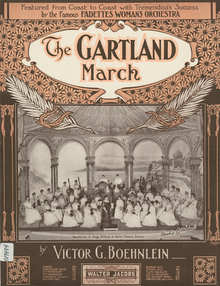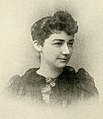| This article's lead section may be too short to adequately summarize the key points. Please consider expanding the lead to provide an accessible overview of all important aspects of the article. (December 2024) |

The Fadettes of Boston (1888 – c. 1920) was an all-women orchestra based in Boston, Massachusetts, and directed by Caroline B. Nichols.
Early history

The group incorporated in 1895 as "the Fadettes of Boston", named after Fanchon Fadette, the titular character of George Sand's novel La Petite Fadette. The original group of six expanded to twenty by 1898, with "a first violin and director, four additional first violins, four second violins, two violas, two violincellos, two contrabassos, kettle-drums and a bass, two flutes and piccolo, two clarinets, two cornets, two French horns, three trombones, snare-drum and 'traps,' and piano-forte."
In 1898, vaudeville manager B.F. Keith booked them into his theatres all over the United States. According to Nichols, between 1890 and 1920 the Fadettes gave over 6,000 concerts, half of them as headliners in first-class vaudeville theatres. At a concert in Pittsburgh in 1902, for instance, the Fadettes played marches, waltzes, songs and arias by Frederic Field Bullard, Daniel Auber, Karl Michael Ziehrer, George M. Rosey, Victor G. Boehnlein and others. The group also performed at the Los Angeles Orpheum.
Performance style
The performers "wore shimmery gowns." Among the musicians were Annie Andros Hawley, Mildred Rogers, and Lillian Thain (violin).
Nichols "conducted the orchestra for thirty years and trained over six hundred women for professional careers as orchestral musicians."
Media
-
 Portrait of Carrie Nichols, conductor, ca.1897
Portrait of Carrie Nichols, conductor, ca.1897
-
 Portrait of Ethel Atwood, orchestra founder, business manager and musician, ca.1893
Portrait of Ethel Atwood, orchestra founder, business manager and musician, ca.1893
-
 Entrance to Keith's Theatre, Boston, with poster for the Fadettes, 1906
Entrance to Keith's Theatre, Boston, with poster for the Fadettes, 1906
-
 Newspaper spread about the Fadettes, Pittsburgh Press, 1909
Newspaper spread about the Fadettes, Pittsburgh Press, 1909
-
 Detail of promotional brochure, 1910
Detail of promotional brochure, 1910
-
 Label of a Berliner Gramophone record; "Morning Serenade", played by the original quartet and recorded in Aug 10, 1897
Label of a Berliner Gramophone record; "Morning Serenade", played by the original quartet and recorded in Aug 10, 1897
Variant names
- Boston Fadettes Ladies Brass Quartette
- Boston Fadette Lady Orchestra
- Boston Fadette Orchestra
- Boston Fadettes
- Fadette Ladies' Orchestra
- Fadette Orchestra
- Fadette Women's Orchestra
- The Fadettes
- The Fadettes Orchestra
- Fadettes Women's Orchestra
References
- University of Iowa Libraries. The Fadettes Womans Orchestra of Boston brochure, ca.1910
- Macera, Rosaria (1996). THE UNFINISHED SYMPHONY (PDF).
- ^ Judith Tick. "Women as Professional Musicians in the United States, 1870-1900." Anuario Interamericano de Investigacion Musical, Vol. 9 (1973), pp. 95-133
- Frances E. Willard (1897), Occupations for women: A book of practical suggestions, for the material advancement, the mental and physical development, and the moral and spiritual uplift of women, New York: The Success Company, OCLC 2665928, OL 24361133M
- Boehnlein. Victor G. The Gartland March. n.d. Boston, MA: Walter Jacobs, 1907. Print.
- ^ "Fadettes win approbation: women's orchestra delights admirers of good music at exposition." The Pittsburgh Press - Sep 20, 1902
- Stan Singer. "Vaudeville in Los Angeles, 1910-1926: Theaters, Management, and the Orpheum." Pacific Historical Review, Vol. 61, No. 1 (Feb., 1992), pp. 103-113
- Beth Abelson Macleod. "'Whence Comes the Lady Tympanist?' Gender and Instrumental Musicians in America, 1853- 1990." Journal of Social History, Vol. 27, No. 2 (Winter, 1993), pp. 291-308
- Sketches of representative women of New England, Boston: New England Historical Pub. Co., 1904, OCLC 123500907, OL 7194233M
- Billboard. Nielsen Business Media, Inc. 1943-09-04.
- Mary Brown Hinely. "The Uphill Climb of Women in American Music: Performers and Teachers." Music Educators Journal, Vol. 70, No. 8 (Apr., 1984), pp. 31-35
- "Berliner matrix 830. Morning serenade / Boston Fadettes Ladies Brass Quartette". Discography of American Historical Recordings. Retrieved 2024-03-03.
- WorldCat. Boston Fadettes Ladies Brass Quartette. Morning Serenade, recorded on Aug. 10, 1897.
- Fadette Ladies' Orchestra, no.25 Winter Street. Boston Almanac, 1894
- "Fadette Ladies' Orchestra ... Mrs. Carrie B. Nichols as leader and Miss Ethel Atwood business manager." cf. Public Opinion v.14, no.1, Oct. 8, 1892
Further reading
- "Fadettes took name from a Sands novel." The Pittsburgh Press - Jun 16, 1907
- Blanche Naylor, The Anthology of the Fadettes. Boston, 1937.
External links
- Johns Hopkins University, Levy Sheet Music Collection. Marie Louka (composer). The Fadettes; March & Two-Step. Philadelphia: World Publishing Co., 1904. "Dedicated to Mrs. Caroline B. Nichols, Director of the Fadettes of Boston, The Famous Ladies' Orchestra."